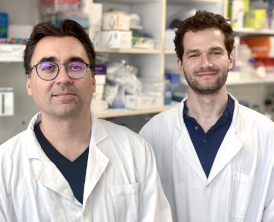
Myotonic dystrophy type 1 (DM1), also known as Steinert disease, is a neuromuscular disorder. This rare genetic disorder affects around one in 8,000 people, making it the most common muscular disease in adults. DM1 is characterised by multi-systemic symptoms, particularly in skeletal muscles (progressive weakness and atrophy, myotonia), cardiac muscle (conduction disorders) and the central nervous system. The genetic mutation causing the disease corresponds to the abnormal amplification of a repeated (CTG) DNA sequence in the DMPK gene. Despite several ongoing clinical trials and therapeutic approaches being evaluated in pre-clinical research, no treatment is currently available for DM1 patients.
Researchers at the Institute of Myology*, in collaboration with two Belgian teams from the University of Liège, have developed a promising new gene therapy approach. This strategy consists in silencing expression of the mutated DMPK gene that causes DM1 using a technique called CRISPRi (or CRISPR interference). This tool is derived from the CRISPR/Cas9 system, the inventors of which were awarded the Nobel Prize in 2020. In experiments on cultured muscle cells from DM1 patients, the researchers demonstrated the effectiveness of this method in silencing expression of the DMPK gene by more than 80%, thereby correcting the cellular abnormalities specific to DM1. Finally, they demonstrated that this approach, due to its design, was also highly specific, potentially limiting possible side-effects.
These results are very encouraging and suggest that inhibition of the DMPK gene using the CRISPRi method could be a promising therapeutic option for treating DM1.
* Florent Porquet, Maria Kondili, Denis Furling et Arnaud Klein work in the team Repeat Expansions & Myotonic Dystrophy (REDs) at the Myology Centre for Research.
